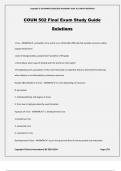Copyright © OLIVIAWEST2024/2025 ACADEMIC YEAR. ALL RIGHTS RESERVED
COUN 502 Final Exam Study Guide
Solutions
Crisis - ANSWER✔✔--perception of an event as an intolerable difficulty that exceeds resources and/or
coping mechanisms
-state of disorganization, people face frustration of life goals
-critical phase when ways of dealing with the world are interrupted
-Precipitating event, perception of the event that leads to subjective distress, diminished functioning
when distress is not alleviated by customary resources
Double ABCX Model of a Crisis - ANSWER✔✔-A: crisis depending on resources
B: perception
C: individual/family and degree of stress
X: from low to high generated by event/situation
4 groups of crises - ANSWER✔✔-1. developmental crisis
2.situational crisis
3. existential crisis
4. ecosystemic crisis
Developmental Crises - ANSWER✔✔--occur during normal flow of human growth and maturation
Copyright ©Stuvia International BV 2010-2024 Page 1/59
, Copyright © OLIVIAWEST2024/2025 ACADEMIC YEAR. ALL RIGHTS RESERVED
-when child leaves home, retirement, teen pregnancy, early/delayed puberty
Situational Crises - ANSWER✔✔--Occur when unexpected, extraordinary event occurs that the person
could not control
-car accident, job loss, death of a loved one, illness, rape
Existential Crises - ANSWER✔✔--intensive, pervasive inner conflict and anxiety associated with
existential issues of purpose, meaning, responsibility
-will not have children, will never get married, will not make a difference in their career field
Ecosystemic Crises - ANSWER✔✔--natural or human-caused disasters
-terrorist attacks, school shootings, persecution of particular populations, war
-hurricanes, tornadoes, tsunamis, wildfires, earthquakes
PTSD - ANSWER✔✔-caused by unresolved trauma
PTSD symptoms - ANSWER✔✔-flashbacks, avoidance of trauma-related activities, fear or helplessness,
emotional numbing, substance abuse, OCD, panic disorder
Post traumatic growth - ANSWER✔✔-resolve cognitive, affective, behavioral reactions
Crisis Intervention - ANSWER✔✔-time-limited treatment directed at reactions to a specific event in order
to help client return to pre-crisis level of functioning
Goals of Crisis Management - ANSWER✔✔--help clients diffuse emotions
-rearrange cognitive processes
-organize and interpret what has happened
Copyright ©Stuvia International BV 2010-2024 Page 2/59
, Copyright © OLIVIAWEST2024/2025 ACADEMIC YEAR. ALL RIGHTS RESERVED
-integrate traumatic event into his/her life story
-interpret traumatic event in a way that is meaningful
Duration of crisis mangement - ANSWER✔✔-no more than 6 weeks
3 counselor functions - ANSWER✔✔-1. assessment
2. listening
3. acting
Equilibrium - ANSWER✔✔-state of emotional mental stability and balance
Disequilibrium - ANSWER✔✔-lack of emotional stability or balance
Mobility - ANSWER✔✔-state of being able to autonomously change or cope in response to different
moods, feelings, emotions, needs, and influences
Immobility - ANSWER✔✔-state of being incapable of change or coping in response to different moods,
feelings, emotions, needs, and influences. Being unable to adapt to the immediate physical and social
world
6 step model of crisis intervention - ANSWER✔✔-1. Define the problem (listening)
2. Ensure client safety (listening)
3. Providing support (listening)
4. Examining alternatives (action)
5. Making plans (action)
6. Obtaining commitment (action)
Copyright ©Stuvia International BV 2010-2024 Page 3/59
, Copyright © OLIVIAWEST2024/2025 ACADEMIC YEAR. ALL RIGHTS RESERVED
The Chinese characters that represent "crisis" means - ANSWER✔✔-danger and opportunity
Psychological First Aid - ANSWER✔✔--protect (preserve safety, health, self-esteem)
-direct (direct to appropriate safe places)
-connect (communication with family, community, service providers)
-detect (assess, triage, provide crisis support)
-select (refer people as needed to mental health services)
-validate (inform and normalize responses/reactions of those involved)
Compassion Fatigue - ANSWER✔✔--response to helping/being involved with people who experience
trauma or extreme predicaments
-also called secondary traumatic stress
-my exhibit forms of symptoms similar to PTSD
Vicarious Traumatization - ANSWER✔✔--changes that alter mental health professionals' views of
themselves, others, and the world
-disruptions in helper's views of safety, trust, esteem, intimacy, control
Burnout - ANSWER✔✔--occurs in hospital settings
-psychiatric units with severe symptomology
Self Care activities - ANSWER✔✔--identify and rely on a support group
-carry an index card listing ways to reduce stress before you are overwhelmed
-relaxation exercises
Copyright ©Stuvia International BV 2010-2024 Page 4/59




